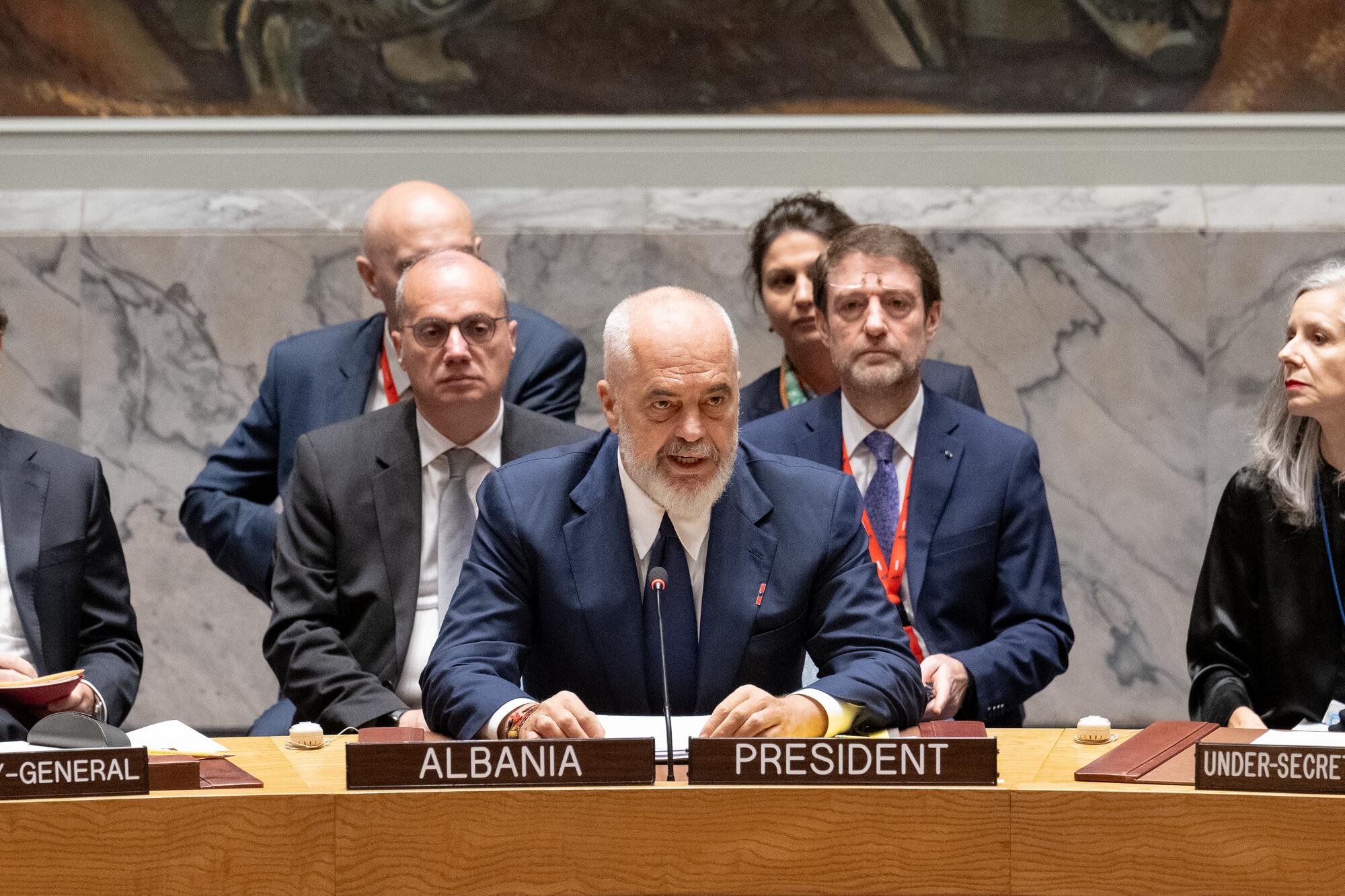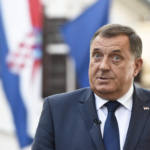On September 20, the UN Security Council met in New York under the chairmanship of the Prime Minister of Albania, Edi Rama. The focus of international delegates’ attention was the issue of Russia’s aggression against Ukraine, in particular, the need to reform international institutions, including the Security Council, so that they could respond more effectively to modern challenges, such as military aggression.
The meeting of the Security Council will be remembered for launching with a verbal spat. The Permanent Representative of the Russian Federation to the UN, Vassily Nebenzya, was outraged by the scheduled speech of the President of Ukraine, Volodymyr Zelensky, who took the floor immediately after the UN Secretary General, Antonio Guterres, at the outset of the meeting. “We want to ask you – on what basis did you decide to give the floor to the President of Ukraine, Volodymyr Zelensky, before the speech of the members of the Security Council?” Nebenzia asked Rama. He tried to take the floor four times, trying to disrupt the Ukrainian president’s speech and demanding that Zelensky be moved to the end of the list – after all representatives of the member states of the UNSC (both permanent and temporary).
Strictly, but diplomatically, Edi Rama snubbed the demand of the Russian Federation. “I must say, coming from you – all this lecture about violating the rules in this building is quite an impressive shoot. But as far as you repeated many times that the violation here is about President Zelensky speaking before the Council members, there is a solution for this if you agree. You stop the war, and President Zelensky will not take the floor. So what made him here important and what it makes important for all of use to hear him first and then discuss is made by you, not by us,” Rama said, pointing out that the only reason for the need to find solutions at the UN Security Council to end Russia’s war against Ukraine is Russia’s unprovoked aggression.
It is worth noting that before the meeting of the Security Council, the prime minister of the presiding Albania comprehensively outlined the country’s position on the Russo-Ukrainian war, noting that just recently it was difficult to imagine that a catastrophic war, unleashed by a permanent member of the Security Council, would endanger the security of Europe, grossly undermining all the principles that gave rise to the UN.
“How to understand those who say “yes, but” or call on both sides to present arguments not to call a spade a spade, refusing to call it brutal aggression – the only and true name. This war of aggression should be everyone’s business. If we cannot unanimously recognize and say loudly who the aggressor is and who is the victim of aggression, it would be an ‘insult to the intellect’ of the Security Council. The struggle of Ukraine is the struggle of everyone who aspires to live in a world where nations are free and equal, where territorial integrity is indisputable and their right to live in the world is indisputable,” Rama emphasized. According to him, abuse of the right of veto made the UN Security Council hostage and paralyzed its work, “but did not make it shut up.”
This opinion was echoed by UN Secretary General Antonio Guterres, who noted that with the growth of geopolitical tension, global problems are growing that cannot be solved without changing approaches. “The world has changed. Our institutions have not. We cannot effectively address problems as they are if institutions do not reflect the world as it is. (…) It is high time to renew multilateral institutions based on 21st century economic and political realities,” Guterres said. According to him, if this does not happen, the international community will face further “fracture”.
President of Ukraine Volodymyr Zelensky went further in his statements. He stated that the UN is currently at a dead end regarding aggression, and what makes the Organization ineffective are Russia’s privileges of membership, which it successfully uses: “This seat in the Security Council, which Russia occupied illegally, through backstage manipulations following the collapse of the Soviet Union, has been taken by liars whose job is to whitewash the aggression and genocide being carried out by Russia. And all the UN actions – either by the Security Council or the General Assembly – that could have stopped this aggression, are shattered by the privilege granted by this seat to the aggressor. Veto power in the hands of the aggressor is what has pushed the UN into a dead end.”
Zelensky called the UN Security Council “the most visible platform in the world”, noting that he believes that the Organization is capable of more, but to this end, long-term talks and projects on reforming the UN must become a concrete process of doing so.
“Humankind no longer pins its hopes on the UN when it comes to the defense of the sovereign borders of nations. World leaders are seeking new platforms and alliances that could reduce the disastrous scope of problems. Those problems that are met here, within these walls, with rhetoric, rather than real solutions, with aspirations to compromise with killers, rather than to protect lives. Life should be defended uncompromisingly to ensure successful protection,” said the president of Ukraine.
The opinion that the use of the right of veto by UNSC permanent members should be limited has gained support among other delegations. For example, Estonian President Alar Karis noted that the Security Council remains a hostage of the aggressor. According to Karis, there should be no right of veto by the permanent members of the Security Council “if there is a suspicion that the reason for this may be an act that contradicts international law.” “It has become a sad reality that the Security Council is unable to act decisively and fulfill its mandate to ensure the implementation of tasks laid down in the UN Charter,” he said.
An hour after Zelensky’s speech, the Minister of Foreign Affairs of the Russian Federation, Sergey Lavrov, entered the hall and launched, as Germany’s Die Welt put it, his “long and difficult to understand historical treatise” about the alleged hypocrisy of the West and its efforts to destroy or humiliate Russia. Lavrov defended Russia’s veto right in the UN Security Council and harshly criticized the U.S. for “open interference in the internal affairs of Ukraine” since the collapse of the Soviet Union. In other words, “he came, gave his speech full of lies, as usual, and left” as the chief of the French Foreign Ministry, Catherine Colonna, said.
Therefore, the UN Security Council under Albania’s chairmanship, although it was supposed to be an open discussion about the Russo-Ukrainian war, raised much broader issues because it was not only about the ideas of peace, but also about the viability and efficiency of the Security Council and the UN in general as this raises reasonable doubts against the background of Russian aggression.
Questions were also raised regarding the expansion of the body at the expense of new members from other world regions – Africa, Latin America, Asia, and the Pacific. Brazil, India, and Germany have been insisting for years on having UNSC membership granted to them, and the UNSC expansion idea also enjoys the U.S. support. Despite this, it is unlikely to expect in the near future any significant changes in the UNSC composition or seeing Russia stripped of its veto right. It is difficult to imagine Russia agreeing to the expansion, even despite the fact that it would be able to strengthen its position at the expense of countries over which the Kremlin retains political influence. Both Germany and Japan would strengthen the influence of Transatlantic democracies, which is definitely not in the interests of Russia and China. At the same time, the current environment is unlikely to contribute to Russia being deprived of its right of veto. That is why Germany did not support this idea, since it is not a permanent member of the Security Council and will not be able to get there should it publicly insist on the move. Russia will be able to veto the inclusion of any country that will insist on the need to limit or revoke Russia’s veto right.
Regardless of the degree of discussion, it is worth noting that Prime Minister Edi Rama orchestrated the meeting of the UN Security Council with dignity. The attempt of the Russian ambassador to bring chaos to the session hall saw a professional rebuff from Edi Rama, who proved to be a hardened diplomat and a reliable guarantor of compliance with the UN Charter.
Meanwhile, the results of the UNSC meeting saw some mixed assessments. In particular, Aleksandar Vučić stated that “at the SC meeting of the Security Council, those who were most aggressive in protecting the territorial integrity of Ukraine were those who were most aggressively destroying the territorial integrity of Serbia.” Any different reaction could hardly be expected from the Serbian president. Also, Vučić emphasized Serbia’s intention to convene a special meeting of the UN Security Council regarding the situation of Kosovo. It should be held in October under Brazil’s chairmanship. Apparently, the principles of the Albanian presidency of the UN Security Council don’t seem to inspire Belgrade too much.



